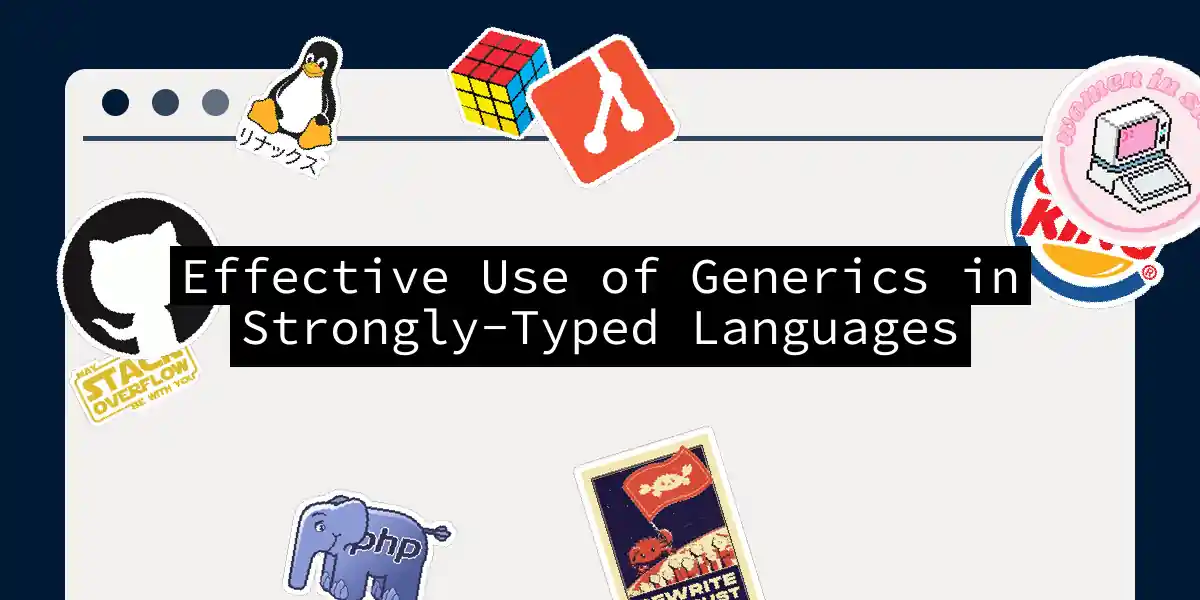What Are Generics and Why Do We Need Them?
Generics are a powerful tool in the arsenal of any software developer working with strongly-typed languages like Java, C#, TypeScript, and others. They allow you to write code that is reusable, flexible, and most importantly, type-safe. But before we dive into the nitty-gritty, let’s set the stage with a simple analogy.
Imagine you’re a chef who needs to cook a dish that everyone will love. It sounds impossible, right? But what if you could create a recipe that works with any ingredient? That’s essentially what generics do for your code – they make it generic enough to work with any type, while ensuring it remains safe and efficient.
The Basics of Generics
Generics are often referred to as parametric polymorphism. This fancy term simply means that you can write code that works with multiple types without the need for explicit type casting or subclassing. Here’s a simple example in TypeScript to illustrate this:
class GenericStack<T> {
private stack: T[] = [];
public push(item: T) {
this.stack.push(item);
}
public pop(): T | undefined {
return this.stack.pop();
}
}
// Using the GenericStack with strings
const stringStack = new GenericStack<string>();
stringStack.push("Hello");
console.log(stringStack.pop()); // Outputs: Hello
// Using the GenericStack with numbers
const numberStack = new GenericStack<number>();
numberStack.push(42);
console.log(numberStack.pop()); // Outputs: 42
In this example, GenericStack<T> is a class that can work with any type T. This means you can create a stack of strings, numbers, or any other type without duplicating code.
Enforcing Type Safety
One of the most significant benefits of generics is type safety. When you use generics, the compiler checks the types at compile time, preventing errors that would otherwise occur at runtime. Here’s an example that highlights this:
const arr = new Array<string>();
arr.push("Hi There"); // This is fine
// arr.push(123); // This would cause a compile-time error
In this example, the Array<string> ensures that only strings can be added to the array. If you try to add a number, the TypeScript compiler will throw an error before the code even runs.
Avoiding Boxing and Unboxing
In languages like C# and Java, using generics can also improve performance by avoiding the need for boxing and unboxing. Boxing is the process of converting a value type to a reference type, and unboxing is the reverse process. Here’s how generics help:
// Without generics
ArrayList list = new ArrayList();
list.Add(42); // Boxing occurs here
int value = (int)list; // Unboxing occurs here
// With generics
List<int> genericList = new List<int>();
genericList.Add(42); // No boxing
int value = genericList; // No unboxing
By using List<int>, you avoid the overhead of boxing and unboxing, making your code more efficient.
Conditional Behavior Based on Type
Generics also allow you to write conditional behavior based on the type assigned to a generic variable. Here’s an example in TypeScript:
class SmartPrinter<T> {
print(data: T) {
if (typeof data === "string") {
console.log(`I am going to print: ${data.toUpperCase()}`);
} else {
console.log(`I am going to print a ${typeof data}`);
}
}
}
const stringPrinter = new SmartPrinter<string>();
stringPrinter.print("Hello"); // Outputs: I am going to print: HELLO
const numberPrinter = new SmartPrinter<number>();
numberPrinter.print(42); // Outputs: I am going to print a number
This example shows how the SmartPrinter class can behave differently based on the type of data it receives.
Refactoring with Generics
Generics are particularly useful when refactoring code. Here’s a scenario where you might use generics to abstract out data types:
// Before generics
class PersonStack {
private stack: Person[] = [];
public push(person: Person) {
this.stack.push(person);
}
public pop(): Person | undefined {
return this.stack.pop();
}
}
class TeacherStack {
private stack: Teacher[] = [];
public push(teacher: Teacher) {
this.stack.push(teacher);
}
public pop(): Teacher | undefined {
return this.stack.pop();
}
}
// After generics
class GenericStack<T> {
private stack: T[] = [];
public push(item: T) {
this.stack.push(item);
}
public pop(): T | undefined {
return this.stack.pop();
}
}
const personStack = new GenericStack<Person>();
const teacherStack = new GenericStack<Teacher>();
By using generics, you eliminate the need for duplicate code and make your classes more flexible and maintainable.
Common Pitfalls and Best Practices
Avoiding Special Cases
One of the worst uses of generics is when you undermine their generality by adding special cases for specific types. Here’s an example of what not to do:
function PersonInfo<T>(psn: T): string {
switch (psn) {
case psn as Student:
return `${(psn as Student).Name} is a student`;
case psn as Teacher:
return `${(psn as Teacher).Name} is a teacher`;
default:
throw new Error(`Cannot handle ${psn.constructor.name} yet`);
}
}
This approach defeats the purpose of generics and makes the code less maintainable.
Using Reflection Wisely
Reflection can sometimes be used to cheat with generics, but it should be avoided as much as possible. Here’s why:
function Map<T, U>(input: T): U | null {
// Using reflection to map types
// This can lead to runtime errors and is generally a bad practice
}
Instead, stick to the principles of parametric polymorphism and keep your code generic.
Visualizing Generics with Diagrams
To better understand how generics work, let’s visualize a simple generic class using a class diagram.
This diagram shows how the GenericStack<T> class can be used with different types like Person and Teacher.
Conclusion
Generics are a powerful tool in software development that can make your code more reusable, maintainable, and type-safe. By understanding how to use generics effectively, you can avoid common pitfalls like special cases and reflection, and instead write code that is flexible and efficient.
Remember, the key to using generics is to keep it generic – avoid making assumptions about the input types and let the compiler do the heavy lifting for you. With practice and the right mindset, you’ll be cooking up generic recipes that everyone will love in no time
